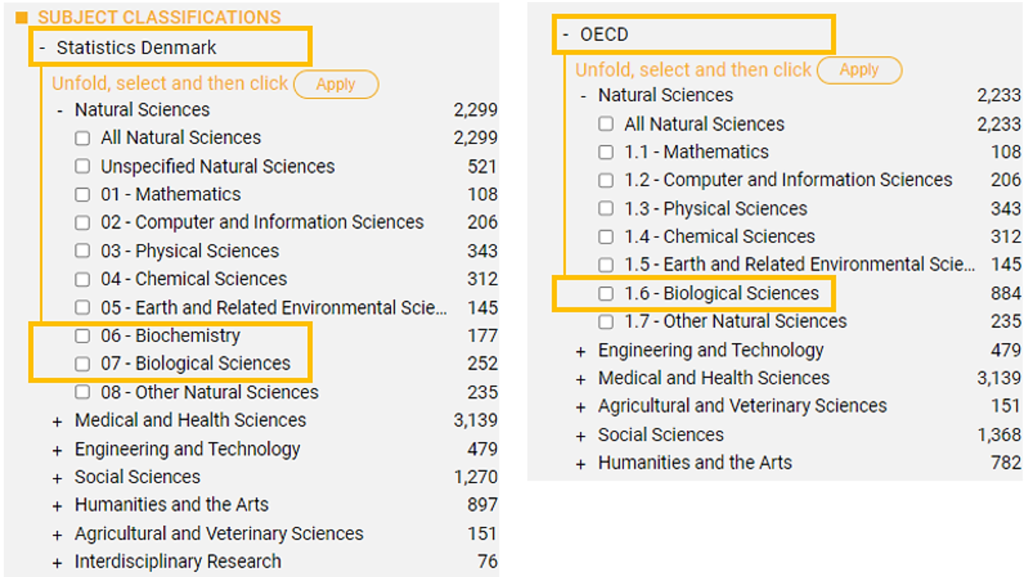Research Portal Denmark showcases grants from Danish public and private funders in the Grants database. The database includes metadata on grants awarded since 2016, to both Danish and international recipients, with a focus exclusively on research grants.
The database is continuously expanded with grant data from additional funders.
Currently, the database includes data from the Carlsberg Foundation, Independent Research Fund Denmark, Lundbeck Foundation, Novo Nordisk Foundation, VELUX FOUNDATION and Villum Foundation. These funders supply data directly to the portal in a data exchange format specifically designed for this purpose.
Read more about the Danish funders providing data here.
Yes, in principle, all Danish funders can contribute data to the database. However, it requires the ability to deliver the data in the defined exchange format, participate in data testing, and subsequently provide grant data 1-2 times a year. We are keen to include grants from more funders, so if you´re interested, please contact us at norainfo@dst.dk to learn more about the possibilities.
Research Portal Denmark collect’s metadata on research grants from selected Danish funders starting from 2016. This includes data such as title, amount, funding instruments and more. Please note that data is displayed at the individual level, so if, for example, you are registered as a Principal Investigator (PI) on a grant, your name will appear in the database. The data exchange format provides a detailed outline of the specific metadata elements we collect from the funders, how they are processed, and which fields are mandatory.
See the list of funders currently contributing data to the grants database.
The scope of grants included in the grant database is defined in collaboration with the Working Group for Funders and Grants.
Only research grants are displayed in the Grants database. These grants are classified by the funders according to Statistics Denmark’s overarching funding instruments, which distinguish between different types of research mechanisms and are more purpose specific.

You can also see which grants are awarded in open competition.

Grant recipients can be affiliated with Danish or international institutions, or they may be individuals without any institutional affiliation. Currently, the database features data from selected Danish funders. In the long term, the grants database is expected to expand to include grants from Cordis, (EU grants), with a focus on those awarded to recipients affiliated with Danish institutions.
In the Grants database, we use both Statistics Denmark’s (DST) and the OECD’s subject classification systems. The classifications are largely similar and cover six main areas:
- Medical and Health Sciences
- Natural Sciences
- Social Sciences
- Humanities and the Arts
- Engineering and Technology
- Agricultural and Veterinary Sciences
However, DST also includes an additional category “Interdisciplinary Research”. While both classification systems are displayed in the database, there are some differences in their subcategories, which is why we show both systems.

Yes, where possible, the funders provide information on publications resulting from a specific grant. These publications are for now identified in the Research Portal’s Local publication database, and a link connects each grant to its corresponding publications.

Publications that are not indexed in Research Portal Denmark are still displayed, though without a clickable link- This may occur, for instance, if the publication lacks an author affiliated with a Danish institution, as the portal only includes publications where at least one author has a Danish affiliation.
NORA Enhancements is a general term for standardized names used across all databases in the Research Portal. Standardization is done to ensure consistent and structured data. Metadata elements collected from various data providers often contain multiple and differing name variations describing the same entity, such as different variations of “Københavns Universitet” (University of Copenhagen).
In the grants database, all Danish affiliation names are standardized (mapped) to one standard name. For example, both “University of Copenhagen” and “Copenhagen University” are mapped to the standardized affiliation name: “KU University of Copenhagen.”
Read more about NORA Enhancements in the technical documentation.
Yes, the seven funders that provide grant data for the first version of the grants database have made significant contributions to the development process, including defining the exchange format, terminology, and scope. Learn more about the working group here.
You can read much more about the funders here.